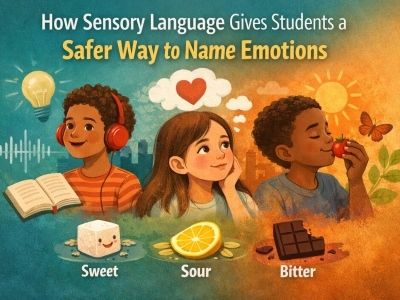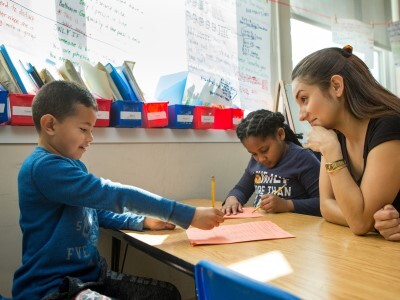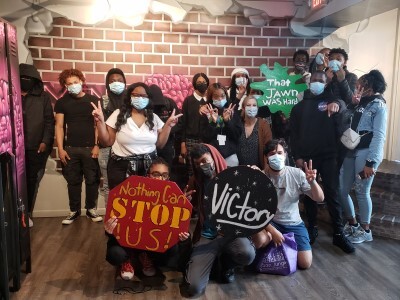Equity in Next Generation Learning
Topics
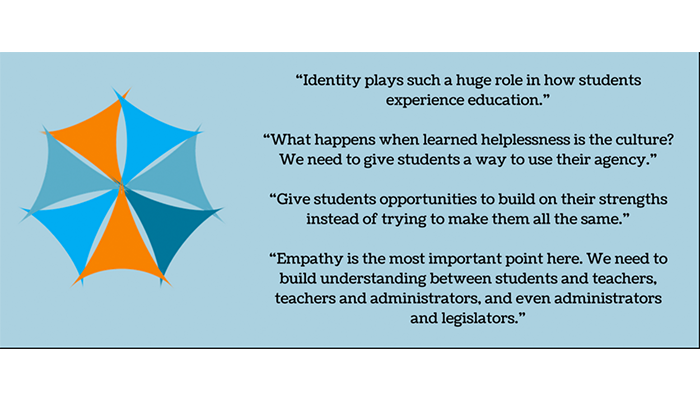
Together, educators are doing the reimagining and reinvention work necessary to make true educational equity possible. Student-centered learning advances equity when it values social and emotional growth alongside academic achievement, takes a cultural lens on strengths and competencies, and equips students with the power and skills to address injustice in their schools and communities.
Practitioner's Guide to Next Gen Learning
Over the past year, the NGLC network has explored what equity means in the context of next gen learning. Here’s what’s emerging from this personal & professional exercise.
The students in the student panel at last month’s iNACOL Symposium remind us to elevate the voices of students and others who have not been heard. To listen. And to engage students in the solutions we seek. It is required in order to achieve equity in next gen learning.
NGLC Is Working Toward Equity
Over the past year or so, the NGLC network has made a concerted effort to explore what equity means in the context of next gen learning. This was a personal and professional exercise. We look to the definition provided by the National Equity Project:
“Educational equity means that each child receives what he or she needs to develop to his or her full academic and social potential.”
And then we asked ourselves, along with next gen school leaders and NGLC Regional Funds partners, and others, this question: How can next gen learning help us reach this noble and deceptively simple goal?
We asked educators to share strategies they use to address the impact of inequity in their model designs. What is their philosophical perspective on the role schooling should fill for students of color and students from low-income communities? How are their classroom practices and professional learning opportunities culturally responsive and equity-minded?
- We recorded those explorations in a blog series.
- We held an #NGLCchat on equity last month and will hold another one this week. Please join us this Thursday, November 17 at 7 p.m. ET at #NGLCchat
- We facilitated and actively participated in equity conversations during the equity-themed iNACOL Symposium.
- And we are in the midst of working with NGLC Regional Funds partners to create a toolkit, Designing for Equity in Next Gen Learning.
Tools to Design for Equity
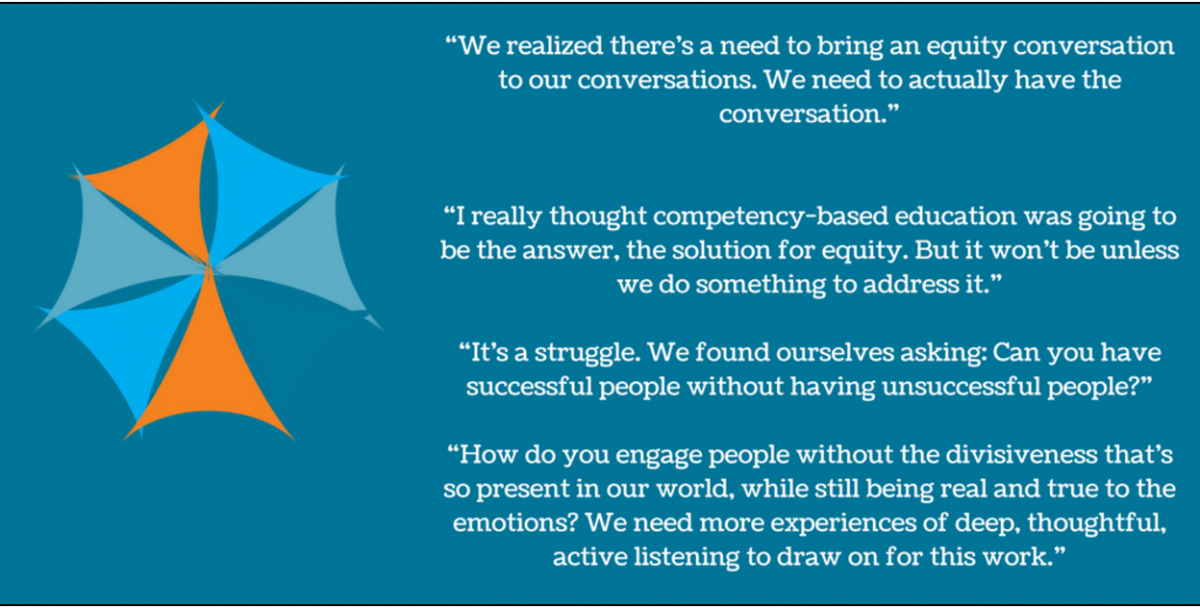
These reflections from iNACOL Symposium participants express how we can’t expect equity to be a natural outcome of our work unless we specifically design for it.
One challenge of becoming active agents for equity and against inequity is that we don’t have a rich history of experiences to rely upon to do this well. And that’s not just because next gen learning is innovative and new.
It’s because we don’t have a lot of practice in the “deep, thoughtful, active listening” that designing for equity requires. To “do equity” well, we would benefit from a better understanding how social identities shape our lives and those of our students as well as the systemic sources of privilege and oppression that shape our society and our education system.
To address this challenge, we collected some of the tools that NGLC Regional Funds partners have used to develop an equity lens in professional learning, organizational growth, and school design and culture. We are in the midst of organizing these tools in a new toolkit called Designing for Equity in Next Gen Learning. The toolkit includes five types of tools:
- Design Principles
- Discussion Protocols
- Professional Learning
- Frameworks
- School Culture (Restorative Justice)
The toolkit explains how these tools are currently being used to create a new narrative in schools and how you might use them to actively and thoughtfully design for equity. Since they have been vetted by and are in use by your peers, we are confident they can make your conversations about equity more transparent, meaningful, and transformative.
Let’s Help Each Other
We need your help. We are asking for your input to improve the toolkit, to make the tools actionable and the toolkit useful, relevant, and effective. We have some specific questions in this feedback form [no longer available; please contact us to provide feedback]. We invite all ideas and reactions as well as recommendations for additional resources that will make this a stronger resource for you and the field. Feedback by Thursday, November 17 will serve our next iteration, but we welcome questions and recommendations at any time to support ongoing iteration and improvement of this toolkit. We want to help you. Jumping into these kinds of conversations without much experience in them may seem daunting. Here are two supports we offer:
- Workshop Agenda. At iNACOL, Caroline Hill, Maggie Runyan-Shefa, Stacey Wang, Finessa Ferrell, Sarah Luchs, and I introduced a group of educators to some of the toolkit’s tools using an agenda that you may want to emulate. We recommend allotting much more time than the two hours we had, yet the steps represented by the agenda are purposeful: 1. Build community and trust with low-risk and joyful activities. 2. Explore individual social identities as sources of both pride and pain to better know each other. 3. Examine systemic oppression and the role of discourse. 4. Engage in design sessions, whether at the student, school, or system level, to reinvent a new, equitable system of learning.
- Ask the Expert. Join the next #NGLCchat on Thursday, November 17, 7 p.m. ET (4 p.m. PT). We’ll have equity experts on hand during the chat to field your questions and offer support. Ask them any range of questions from tips for initiating and facilitating challenging conversations to hiring for equity and designing equitable next gen schools.
Engage Your Heart and Mind
I stated above that NGLC’s journey into equity and next gen learning has been both personal and professional. Our team is tapping into our personal passions for justice and doing what’s right for “other people’s children.” We are examining our biases and privileges that influence how we approach next gen learning. We are listening to students like those on the iNACOL panel. We are responding to our deep convictions and care for the children and their families who trust in us as educators. We see that same passionate engagement from all NGLC educators who are invested in equity. When we bring our hearts and minds together, it sustains us, helps us persist when the conversations get difficult and uncomfortable, and makes our work more meaningful and powerful. We encourage you to engage both your mind and your heart, perhaps with these suggested actions:
- Try using the tools - We encourage you to explore Designing for Equity and, if you are new to this work, first test one of the resources with a small, supportive team.
- Write about your journey - Share your efforts to reimagine educational equity and next gen learning design on our blog. Read our ongoing equity series to become informed and inspired and send your blog idea.
- Stay in it - This can be messy and you may stumble along the way, as I have and will again. Next gen learning recognizes mistakes as opportunities to learn, a concept that holds true when it comes to working toward equity. Even our mistakes will get us authentically closer to the goal of equitable learning.
- Give us feedback and join our chat - As noted above, please send your recommendations for improving the equity toolkit and join #NGLCchat on November 17, 7 p.m. ET.


